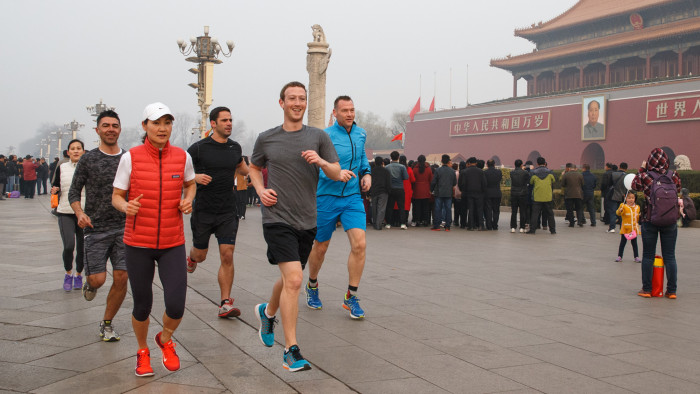Facebook and the high cost of a Beijing ‘like’

Simply sign up to the Chinese politics & policy myFT Digest -- delivered directly to your inbox.
In the first line of The Social Network, the actor playing Mark Zuckerberg tells his incredulous date that there are more people with genius-level IQs in China than people of any kind living in the US. The Facebook founder has said the 2010 biopic was inaccurate and hurtful. But Aaron Sorkin, the screenwriter, clearly got one thing right: Mr Zuckerberg’s obsession with China.
In a high-profile visit to Beijing last week, mocked by some Chinese and western “netizens” as the “Zuck-up”, Mr Zuckerberg went running in Tiananmen Square in lung-ripping smog. Thousands took to his Facebook page to pillory his picture of himself smiling as he jogged past the Forbidden City.
Many Chinese netizens living overseas attacked him for ignoring the painful history of the 1989 Tiananmen massacre; others derided him for whitewashing the shocking levels of air pollution endured by Beijing dwellers. Some wondered why the hordes of security agents who normally patrol the square and arrest anyone holding an event or gathering were absent from the shot.
Some also asked how he managed to upload the picture to Facebook from inside China. Like Twitter, Google and YouTube, the site is blocked by the Great Firewall government censorship regime. The big US tech companies argue that, as well as blocking dissent, Chinese censorship is a form of non-tariff trade barrier aimed at protecting domestic champions such as Baidu, Tencent and Alibaba from competition. Yet Mr Zuckerberg, alone among his peers, has relentlessly pursued re-entry to this tantalising market with an ever more obsequious charm offensive.
In a meeting during his Beijing visit, splashed across state television last week, he sat in an overstuffed armchair in a suit and red tie listening attentively to Liu Yunshan, the Communist party leader responsible for propaganda and ideological purity. According to official reports, Mr Zuckerberg “spoke highly of the progress China has made in the internet field, saying he would work with Chinese peers to create a better world in cyber space”.
Mr Zuckerberg, who is married to an American of Chinese origin, has learnt to speak rudimentary Mandarin; and in 2014, amid his first big push to ingratiate himself, he showed China’s internet tsar his personal copy of President Xi Jinping’s speeches. He also reportedly said he had bought copies for his staff as he “wanted them to understand socialism with Chinese characteristics”.
But these efforts have not gone down well with the people whose eyeballs he is trying to reach. In the wake of his visit, the flood of scorn from ordinary Chinese netizens and even some tightly controlled media outlets prompted state propaganda authorities to issue a new censorship order. “Go a step further in controlling malicious commentary on Facebook founder Zuckerberg’s visit to China,” said a leaked directive. “Stop hyping the story.”
This reaction highlights the risks inherent in Mr Zuckerberg’s approach. First there is the ethical dimension. At a time when lawyers, feminists, human rights activists and booksellers are being arrested or “disappeared”, often for posting critical opinions on social media, it seems morally questionable to be pushing so hard to enter this market.
But even in purely mercenary terms it is unclear how effective Mr Zuckerberg’s approach will prove. It is quite possible it will lead to Facebook being unblocked since, unlike other companies such as Google and Twitter, there is no highly successful Chinese alternative to Facebook and therefore no strong commercial lobby to block its entry.
But that will happen only under the most onerous conditions, including a promise to base Facebook servers in China, to hand over users’ private information and communication to the security apparatus and to employ an army of censors to delete “sensitive” content.
Mr Zuckerberg may be able to stomach many of these conditions as part of the price of entry. But as the party ramps up repression, eventually it will demand something from him that he just cannot do. At that point Facebook will be punished especially hard for what the authorities will view as betrayal by a formerly loyal lapdog.
As Mr Zuckerberg may already know, the Chinese phrase for sycophancy is pai ma pi, meaning “to stroke the horse’s posterior”. But there is an associated saying that warns if you stroke the horse’s posterior too hard and run your hand down its leg then you are likely to be kicked in the head.
Letter in response to this column:
It’s hypocritical to expect to have it both ways, Mr Zuckerberg / From Prof Yeomin Yoon
Comments